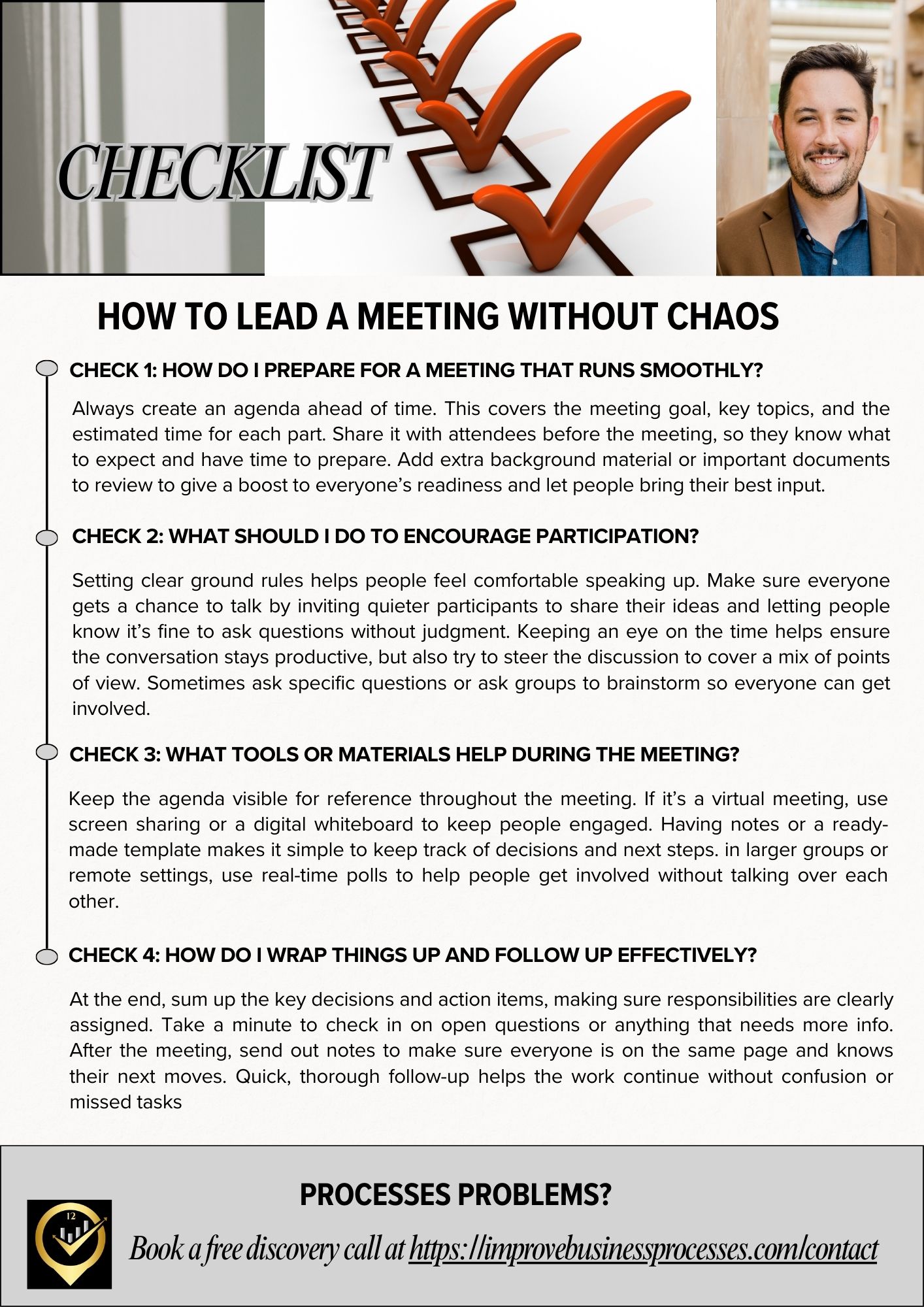Want to run meetings that don’t waste time or drain energy? Learn how to lead a meeting with clarity, confidence, and zero chaos—even if you’re not a natural-born leader.
If you’ve ever sat in a meeting wondering, “Why am I even here?”—you’re not alone. I used to lead meetings that ran longer than a slow Monday and ended with everyone more confused than when we started.
Eventually, after too many glazed-over stares and derailed agendas, I realized I had to get serious about learning how to lead a meeting that actually works.
And here’s the thing: chairing a meeting isn’t just about talking the most or slapping an agenda together. It’s about guiding your team through a shared goal—without losing momentum or minds.
In this post, you’ll learn:
- How to set meeting objectives that don’t suck
- My go-to tricks for engaging meeting strategies
- What to do when things go off the rails (because they will)
- How to handle those “I have one more thought…” hijackers
Why Most Meetings Fail (and How to Avoid That Mess)
Before we dive into how to lead a meeting, let’s talk about what not to do—because knowing what to avoid is half the battle.
I once scheduled a 2-hour strategy session without an agenda. Costly mistake! What started as a focused brainstorm turned into an impromptu venting session. We got absolutely nothing done.
Why did it flop?
- No clear meeting agenda planning
- No properly set meeting objectives – only “ideas” in your mind
- Zero boundaries on time or topic
- And of course, too many cooks in the kitchen
Moral of the story? Running productive meetings starts with being intentional.
How to Lead a Meeting Effectively
1. Set the Goal First—Always
Every great meeting starts with one question: What’s the point?
Define one clear purpose. Are you making a decision, brainstorming ideas, sharing updates? Be specific. This helps with:
- Meeting management techniques
- Sharper team collaboration
- Easier decision-making in meetings
Even now, I won’t send out a calendar invite unless I can write the objective in one sentence. It forces clarity. Your team will thank you.
2. Create an Agenda That Doesn’t Feel Like Homework
People don’t hate meetings—they hate boring, pointless ones. A good meeting agenda planning strategy includes:
- 3 to 5 bullet points, max
- Time limits for each topic
- Names next to who’s leading what
And I’ll be honest, I add emojis to mine. It keeps things light but structured. Oh, and always include a little buffer time. Nothing kills energy like running late.
3. Keep It Tight, Keep It Right
No one likes a rambler. I learned this the hard way when my team started muting themselves during my monologues (yep, busted). Instead:
- Stick to your meeting ground rules
- Use a timer or assign someone to watch the clock
- Park off-topic discussions in a “parking lot” list
These habits make you look like a pro at meeting facilitation skills—even if you feel like you’re winging it.
4. Get Everyone Talking (But Not at Once)
Some folks love to talk, others won’t say a peep unless asked. You’ve got to balance both. Try these:
- Kick things off with a round-robin check-in
- Ask open-ended questions like, “What’s one risk we haven’t considered?”
- Use silence strategically—people hate awkward pauses, so they’ll eventually speak
You’ll naturally build leadership communication skills just by listening more than you speak.
5. Address Conflict Without Turning Into a Therapist
At some point, someone’s going to disagree. Good! That means people care.
What’s not good? Letting it derail your agenda.
Here’s how I manage it:
- Acknowledge the disagreement
- Bring it back to the goal: “Let’s table that and come back once we cover the priorities.”
- Follow up 1:1 if emotions are high
Conflict resolution in meetings is tough, but being calm and direct helps you earn respect.
6. Chairing a Meeting Effectively – Don’t Let the Meeting Die After It Ends
If nothing happens after the meeting, did it even count?
Wrap up by:
- Summarizing key takeaways
- Assigning action items (with names and deadlines)
- Sending a brief follow-up within 24 hours
Boom. You just crushed meeting follow-up strategies—without nagging anyone.
Common Pitfalls to Avoid When Learning How to Lead a Meeting
Even the best leaders mess up. Just watch for these traps:
- Inviting everyone under the sun
- Turning every meeting into a brainstorming session
- Not adapting for virtual meeting leadership
- Talking over your quieter team members
- Ending without clear next steps
If you’re guilty of any of these, don’t sweat it. I’ve done them all. The good news? You’ll get better every time you lead. Here’s a tested and true checklist you can print to use for ALL your meetings!

Conclusion: Chairing a Meeting Easily is Doable
Learning how to lead a meeting without chaos isn’t about being the loudest voice in the room—it’s about creating space for everyone to contribute, keeping things organized, and walking away with clarity.
Will every meeting go perfectly? Nope. But each one is a chance to practice meeting facilitation skills, sharpen your leadership communication, and become the kind of leader people actually want to listen to.
And hey—if you ever mess it up? Own it, fix it, and move on. That’s leadership, too. We can help!
Need Help? Contact BCINC for Assistance Now!FAQs about How to Lead a Meeting
How do you start a meeting effectively?
Start with a warm welcome, a quick recap of the meeting’s purpose, and a brief review of the agenda. Keep it short and positive.
What makes a meeting productive?
Clear objectives, time limits, focused discussion, and defined action items. Also—less rambling, more listening.
How do I keep a meeting on track?
Use time limits, redirect off-topic comments politely, and stick to the agenda. Assign someone as a timekeeper if needed.
What are the best tools for virtual meeting leadership?
Zoom, Microsoft Teams, or Google Meet paired with tools like Notion, Miro, or Loom for visuals and follow-ups. Choose your preference.
How do I deal with difficult participants?
Stay calm, redirect gently, and follow up privately if the behavior continues. Set ground rules early to avoid issues.
References
G. Que (2024) How to Run an Effective Meeting: 8 Steps for Success https://fitsmallbusiness.com/how-to-run-an-effective-meeting/

